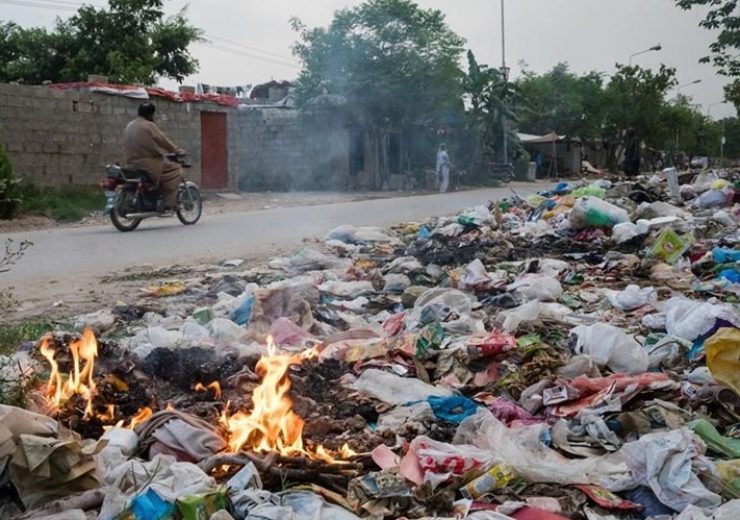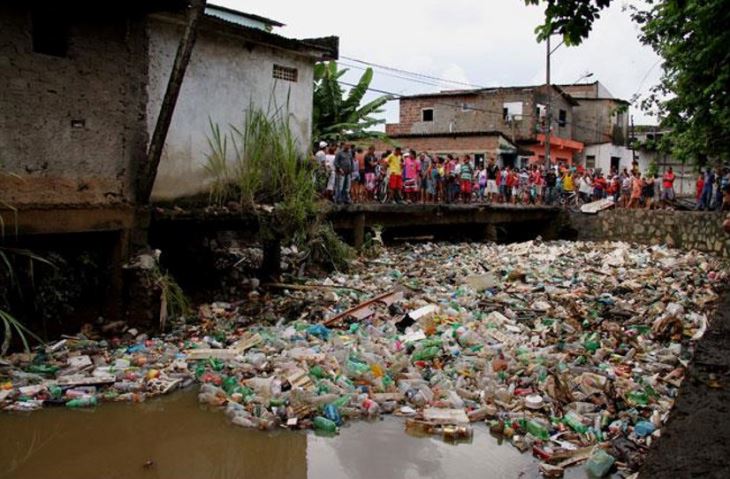The No Time to Waste report, backed by Sir David Attenborough, says the deaths caused by plastic waste are due to a lack of access to good waste management

Burning of waste (Hazel Thompson/Tearfund)
Plastic waste has caused the deaths of between 400,000 and a million people globally, each year according to a new report.
The Sir David Attenborough-backed No Time to Waste study claims this is due to factors including flooding caused by blockages of waterways and drains, as well as plastic pollution, which in turn creates a breeding ground for disease-carrying flies.
It also found the equivalent of two double-decker busloads of plastic waste is being thrown away in the UK every 30 seconds – while in developing countries, it’s equal to 30 busloads.

Research was compiled by environmental and poverty charities Fauna & Flora International (FFI), Tearfund, and WasteAid, as well as the Institute of Development Studies.
Institute of Development Studies research fellow and co-author of the report, Patrick Schröder, said: “Plastic pollution is damaging our planet and our lives.
“The current model of ‘take, make, and waste’ is unsustainable.
“Businesses, governments and citizens need to embrace a ‘circular economy’ that promotes sustainable consumption and production, and reduces environmental impacts.
“There are a growing number of examples of the circular economy in action – particularly across Africa and Asia – and we need to learn from these initiatives to inform and scale future efforts to tackle this pressing global challenge.”
Environmental damage caused by plastic pollution
According to the report, for every person born since the 1950s, one tonne of plastic has been produced and less than a tenth of this has been recycled.
Around half the amount of plastic waste produced globally is packaging that is used just once.
The increasing usage of single-use plastics is part of a bigger waste crisis in developing countries that either inadequate or non-existent waste management systems are struggling to deal with.

Two billion people lack access to properly regulated solid waste collection – that’s one in four people globally – while a further one billion don’t have controlled waste disposal.
In the poorest countries, about 93% of waste is burned or discarded in roads, open land, or waterways.
What the No Time to Waste report recommends should be done to combat plastic waste deaths
The report highlights the importance of waste pickers, individuals who play a vital role in sorting and recycling waste – which they either sell or reuse for personal consumption.
It states that, in considering the solutions to the plastic pollution crisis, it is vital that any waste management initiatives treat waste pickers as major stakeholders, and seek to work in partnership with them.
The study also offers recommendations as to what multinational corporations, citizens and governments should do.
These range from working in partnership with waste pickers to create safe jobs, to avoiding investment into “white elephant” projects in developing countries, such as incineration, that threaten waste pickers’ livelihoods.
We ignore the problems of plastic waste “at our peril”, says Sir David Attenborough

Sir David, vice-president of the FFI, has presented a large number of nature documentaries, including BBC show Blue Planet and Netflix programme Our Planet most recently.
He said: “I have seen for myself the effects of plastic pollution on some of our planet’s most precious species and natural places – an unfolding catastrophe that has been overlooked for too long.
“But we ignore it at our peril.
“This report is one of the first to highlight the impacts of plastic pollution not just on wildlife but also on the world’s poorest people.
“Humankind’s ability to produce this material on an industrial scale far outstrips our ability to manage it, and as a consequence, plastic is choking our rivers and seas.
“This is particularly true in poorer countries, where the ability to manage waste is inevitably overwhelmed by the sheer quantity of plastic being used.
“In turn, this is causing serious illness and even death for countless people and wild species, as this report outlines.
“We need leadership from those who are responsible to introducing plastic to countries where it cannot be adequately managed, and we need international action to support the communities and governments most acutely affected by this crisis.
“If there is one thing humans are adept at, it is finding clever solutions to the conundrums we face.
“It is high time we turn our attention fully to one of the most pressing problems of today – averting the plastic pollution crisis – not only for the health of our planet, but for the well-being of people around the world.”
